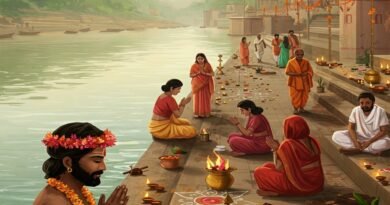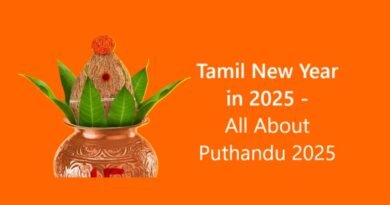
Malayalam Festivals: Kerala’s Rich Cultural Heritage
Kerala, often referred to as ‘God’s Own Country,’ is a land of diverse cultural traditions and vibrant festivals. The state follows the Malayalam calendar, and its festivals are deeply rooted in Hindu customs, mythology, and temple rituals. These celebrations bring together communities and showcase the unique spiritual and cultural fabric of Kerala. Let us explore some of the most famous and popular Malayalam festivals and their significance.
1. Onam – The Grand Harvest Festival
Onam is the most prominent festival in Kerala, celebrated with immense enthusiasm by Malayalis worldwide. It marks the homecoming of the legendary King Mahabali and is observed during the month of Chingam (August-September). The festival lasts for ten days, with grand feasts (Onasadya), floral decorations (Pookalam), traditional dance performances like Thiruvathira and Pulikali, and the famous Vallamkali (boat races). Onam is a festival of unity, prosperity, and gratitude for a bountiful harvest.
2. Vishu Kani – Welcoming the New Year with Auspiciousness
Vishu, observed during Mesha Sankranti in April, marks the beginning of a new agricultural year. The highlight of Vishu is ‘Vishu Kani,’ an arrangement of auspicious items such as rice, fruits, flowers, gold, and a lit lamp placed before Lord Krishna’s idol. It is believed that seeing the Vishu Kani first thing in the morning brings prosperity and good fortune for the rest of the year. Vishukkaineettam, the ritual of giving money to younger family members, adds to the festive spirit.
3. Ashtami Rohini – The Birth of Lord Krishna
Ashtami Rohini, also known as Krishna Janmashtami, is the celebration of Lord Krishna’s birth. This festival is observed in the month of Chingam (August-September) and is marked by devotional singing, temple processions, and special prayers. In Kerala, devotees visit Guruvayur temple and other Krishna temples to seek blessings. Children dress up as Lord Krishna and participate in cultural programs, re-enacting episodes from Krishna’s life.
4. Malayalam New Year – Chingam 1
The first day of the Malayalam calendar, Chingam 1, is observed as Malayalam New Year. Unlike Vishu, this is not a widely celebrated festival but is significant for marking the beginning of new endeavors, business ventures, and agricultural activities. People visit temples to offer prayers for prosperity and happiness.
5. Mandala Pooja – Austerity for Lord Ayyappa
Mandala Pooja is an important ritual observed at the Sabarimala temple in Kerala. It marks the conclusion of a 41-day-long period of strict austerity and devotion by devotees of Lord Ayyappa. The festival falls in the Malayalam month of Dhanu (December-January) and is characterized by temple rituals, special poojas, and the offering of sacred garlands and ‘Irumudi Kettu’ (sacred offerings) to Lord Ayyappa.
6. Vinayaka Chaturthi – Worship of Lord Ganesha
Vinayaka Chaturthi, dedicated to Lord Ganesha, is celebrated with devotion in Kerala, especially in temples. It falls in the month of Chingam (August-September) and is observed with special pujas, offerings, and immersion of Ganesha idols in water bodies. Unlike in Maharashtra, where grand processions are common, the celebrations in Kerala are more traditional and temple-centered.
7. Vidyarambham – The Beginning of Knowledge
Vidyarambham is a unique festival that marks the initiation of children into the world of learning. It is observed on Vijayadashami, the final day of Navaratri, at Saraswati temples and cultural centers. Scholars, priests, and teachers guide young children to write their first letters in rice or sand, symbolizing the start of formal education.
8. Attukal Pongala – The Largest Women’s Festival
Attukal Pongala is a world-renowned festival dedicated to Attukal Bhagavathy, celebrated at the Attukal temple in Thiruvananthapuram. Millions of women gather to prepare Pongala (a sweet rice dish) in earthen pots as an offering to the Goddess. This festival, held in the month of Kumbham (February-March), has earned a place in the Guinness World Records for the largest congregation of women devotees.
9. Thrissur Pooram – The Spectacular Temple Festival
Thrissur Pooram, celebrated at the Vadakkunnathan Temple in Thrissur, is one of the grandest temple festivals in Kerala. It takes place in Medam (April-May) and is famous for its magnificent elephant processions, traditional percussion music (Panchavadyam), and dazzling fireworks display. The festival showcases Kerala’s rich temple traditions and cultural heritage.
10. Makaravilakku – The Celestial Light at Sabarimala
Makaravilakku is one of the most significant events at the Sabarimala temple, observed on Makara Sankranti (January 14th). Devotees gather to witness the divine Makaravilakku light, which appears thrice on the hilltop, believed to be a celestial blessing. This festival also marks the conclusion of the annual Sabarimala pilgrimage, drawing millions of Ayyappa devotees.
11. Mandalakala Begins – Commencing Ayyappa Devotion
Mandalakala is the 41-day period of austerity and spiritual discipline observed by Lord Ayyappa devotees, beginning on the first day of Vrischikam (November-December). Devotees follow strict vegetarian diets, wear black or saffron attire, and undertake penance before embarking on their pilgrimage to Sabarimala.
12. Guruvayur Ekadashi – Devotion to Lord Krishna
Guruvayur Ekadashi, observed in the month of Vrischikam (November-December), is dedicated to Lord Krishna and is considered the most sacred Ekadashi at the famous Guruvayur Temple. Devotees fast and offer special prayers to seek blessings. The festival is also significant as the day when the legendary Chembai Music Festival is held, honoring the legacy of classical Carnatic musician Chembai Vaidyanatha Bhagavatar.
Conclusion
Malayalam festivals reflect the spiritual depth, cultural richness, and communal harmony of Kerala. These celebrations are not just religious events but also social gatherings that unite people in joy and devotion. Whether it is the grandeur of Onam, the spiritual rigor of Mandala Pooja, or the vibrancy of Thrissur Pooram, each festival adds to the charm of Kerala’s cultural landscape. These traditions, passed down through generations, continue to thrive, keeping the state’s heritage alive and vibrant.






